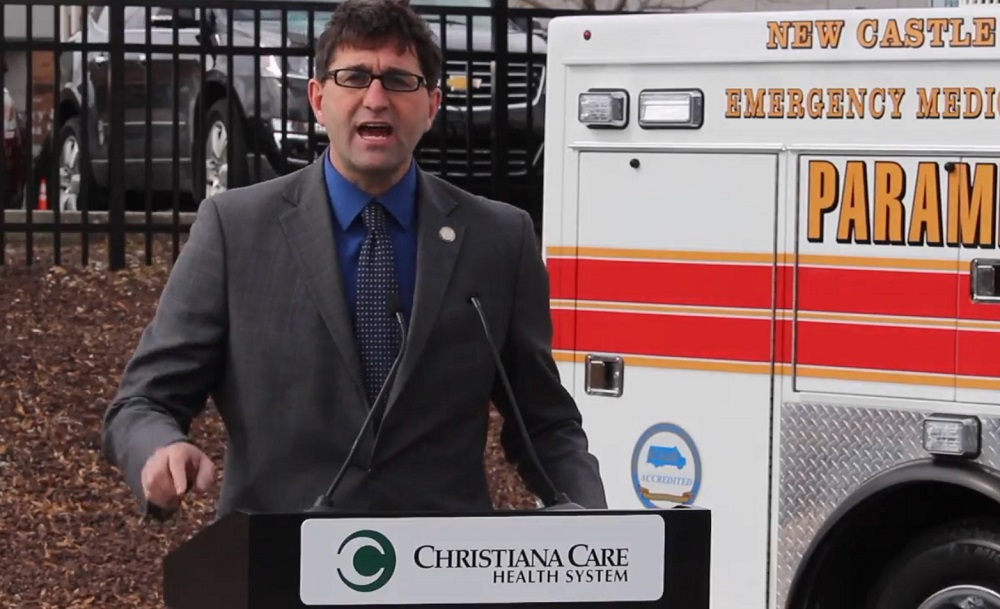Community Substance Overdose Support (SOS) Program will visit survivors in their homes after an overdose and offer assistance, counseling and referrals to drug rehabilitation facilities
Newark, Delaware – Today Christiana Care Health System and New Castle County announced the creation of an innovative pilot program to help individuals receive addiction treatment and support after they are released from the emergency department (ED) following treatment from an opioid overdose.
Launching in fall 2018, the program – called the Community Substance Overdose Support (SOS) Program – will create a response team of specially trained engagement specialists who, with the patients’ consent, will visit with patients at home following an overdose. The team will provide education and access to resources to patients and their families to help break the cycle of addiction. These may include addiction counseling and medication-assisted treatment, and training on proper administration of the overdose-reversing drug Naloxone (Narcan).
“The opioid crisis has claimed tens of thousands of lives across the nation, and it continues to ravage families here in our community,” said Janice E. Nevin, M.D., MPH, Christiana Care president and CEO. “To solve it, we need to work in new ways — together. We know, through our breakthrough work in Project Engage, that when we reach patients in a reachable moment during a hospitalization, we can help them out of addiction and back into a healthy life. This new partnership will enable us to take this successful model out into the community, to reach more individuals and more families with the help and expertise that they need to break the cycle of addiction.”
Christiana Care has made a $500,000 commitment to support the pilot program, including in-kind support of Christiana Care staff from Project Engage, Christiana Care’s Office of Health Equity and the Behavioral Health Service Line. Plans are to expand the program based on learnings after the initial phase.
“This is the public health emergency of this generation,” said New Castle County Executive Matt Meyer. “Leadership requires that we intelligently identify gaps in care and act collaboratively and quickly to address such gaps. Today is about doing just that.”
Delaware, and especially New Castle County, is experiencing an alarming increase in opioid overdoses. According to the latest data from the Centers for Disease Control and Prevention, Delaware reported the second highest percent change for suspected opioid overdose emergency department visits (105 percent) of 16 states participating in enhanced data surveillance for the period from July 2016 to September 2017. Of 2,075 suspected overdose-related emergency department visits during this time, 1,529 (74 percent) were in New Castle County. Moreover, the number of ED overdose visits more than doubled in New Castle County from 189 in the third quarter of 2016 to 464 in the third quarter of 2017.
The Community SOS team will consist of at least two engagement specialists with the likely addition of more personnel as the program advances. During engagement with overdose survivors and their families, the team will use motivational interviewing, a method that has proven successful in addiction counseling, to empower each patient in the decision-making process to take that critical first step to accept help for their substance use. The team will also offer Naloxone to family members and cohabitants of overdose patients to improve survivability in the event of a repeat overdose incident.
The Community SOS program is an extension of Christiana Care’s comprehensive approach to addiction medicine, which includes an opioid withdrawal clinical pathway and the nationally recognized Project Engage, which has been successful in reaching patients with substance use disorder in the hospital while they are in a “reachable moment.”
“Addiction is a brain disease,” said Erin Booker, LPC, corporate director of Behavioral Health at Christiana Care. “The good news is that as health care professionals, we have evidence-based tools that work to help people pull themselves out of addiction. This partnership with New Castle County creates important collaboration with emergency responders who know the community well, and who often struggle with saving lives time after time from overdoses, too often knowing that it will happen again if that patient doesn’t receive extra help. This partnership provides that help with the important component of an engagement specialist who is a peer and has been through the process of fighting addiction.”
Source: County Executive’s Office


